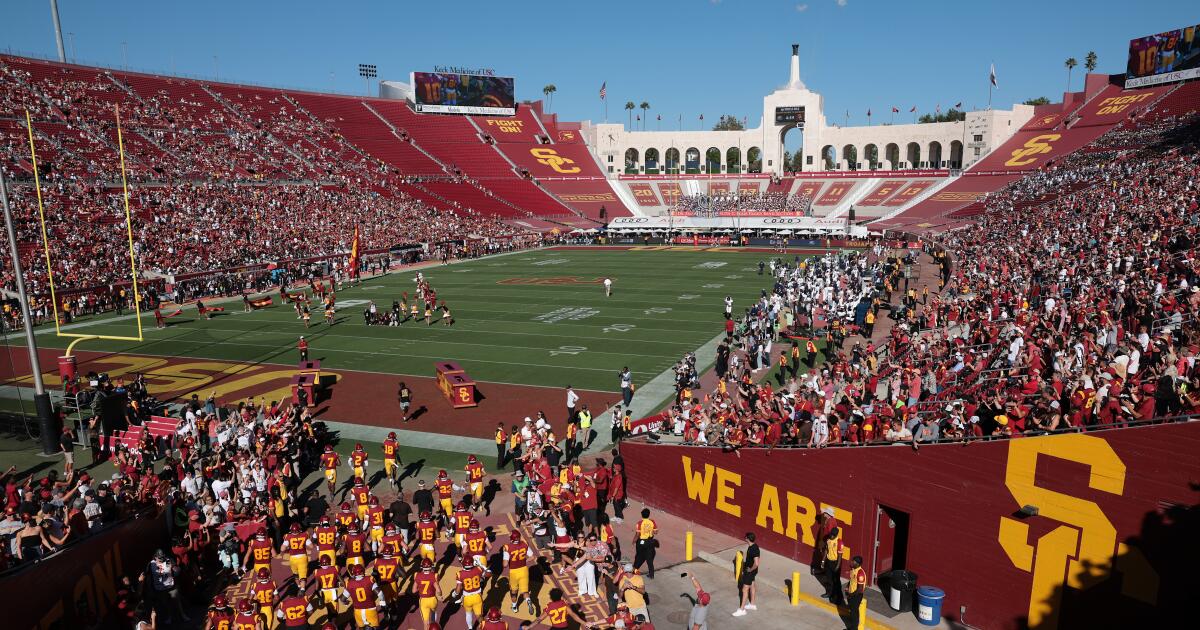L.A. Olympics will likely force USC football to play at SoFi Stadium
Since it first opened in 1923, the Los Angeles Memorial Coliseum has been the sole home of USC football. No major sports team in the city’s history has played in the same venue for longer.
But after more than a century spent in the city’s iconic stadium, The Times has learned that the 2028 Summer Olympics and Paralympic Games will likely force USC to find a new home for its football team in 2028, with the likeliest option being SoFi Stadium in Inglewood.
Multiple people with knowledge of the situation not authorized to discuss it publicly told The Times that the Coliseum would not be ready for the start of college football season in September 2028 because of the $100-million temporary track that’s being built on top of the Coliseum field to host the track-and-field competition at the L.A. Olympics and Paralympic Games.
The logistics are still being worked out with L.A. 2028, and USC has not made a final decision about where the Trojans’ 2028 football season will be played. A source said the school hasn’t officially determined whether the Coliseum field could be ready later in the fall, perhaps to host a portion of USC’s 2028 home schedule. But even if it is logistically possible, it’s not clear that USC’s athletic department would find that arrangement in its best interest, given it would mean uprooting the team midseason or spending a long stretch of the 2028 slate away from L.A.
“USC and LA28 are working in lockstep on all logistics for the Olympic and Paralympic Games,” USC athletics spokesperson Cody Worsham said in a statement. “We will share details with the public when they are finalized.”
SoFi Stadium officials declined to comment when asked about USC’s possible move to the venue in 2028.
With the closing ceremonies of the Paralympic Games set for Aug. 27, 2028, there would be just two weeks for the temporary track to be removed and the grass field below to be restored ahead of USC’s currently scheduled 2028 home opener on Sept. 9. Multiple people told The Times that’s not a feasible timeline for a structure LA28 chairman Casey Wasserman once called “the most expensive and probably complicated thing we actually have to build” ahead of the 2028 Games.
This isn’t a new problem at USC. Discussions about the plausibility of the football program sharing the Coliseum with the Olympics in 2028 trace back well before current athletic director Jennifer Cohen was hired in 2023. The belief at one point, according to a person familiar with those discussions, was that with some clever scheduling, USC would only have to miss a home game or two.
Now, according to multiple people familiar with the situation, USC is expected to spend the 2028 season at SoFi Stadium, which hosts the NFL’s Rams and Chargers. By that point, it may also be the home field of the city’s other Big Ten football team.
UCLA has already stated it plans to trade the Rose Bowl, where it has played since 1982, for the modern SoFi Stadium, in spite of a lease agreement that runs through 2044. The city of Pasadena and the Rose Bowl Operating Company have since sued the school and SoFi Stadium’s ownership in hopes of blocking the Bruins’ move.
If UCLA forges on with plans to abandon the Rose Bowl in 2026 for SoFi, all four of the city’s major football teams could be playing under the same roof two years later.
Those logistics, however, pale in comparison to what it will take to host Olympic track and field at the Coliseum in 2028, in the same stadium where the competition was held almost a century earlier. The biggest obstacle LA28 faced using an iconic venue that hosted the 1984 Olympics is that there wasn’t enough room on the Coliseum floor for an Olympic-sized track.
Renovations in the early 1990s added 14 rows of seats at the bottom of the bowl, shrinking the size of the Coliseum field. The solution requires installation of a track 11 feet above the field that stretches over the first few rows of stadium seating to met Olympic standards.
To build the temporary track, the Coliseum’s turf and the dirt beneath it will be scraped away, down to the stadium’s concrete base where columns will be placed about every 10 feet. That construction at the Coliseum is expected to begin immediately after the Trojans finish their home football schedule sometime in November 2027.
Bill Hanway, the executive vice president for AECOM — the infrastructure consulting firm hired to oversee LA28’s preparations — told The Times in June 2024 that the track was “an incredibly complex build” in “an incredibly tight space.”
Taking track down will be its own challenge, one that will take longer than the two-week window between the end of the Games and the beginning of USC’s 2028 slate. When a similar structure was built for the 2014 Commonwealth Games in Glasgow, Scotland, the soccer team that played in the stadium — Queen’s Park FC — didn’t return for more than a year.
Unless that timeline can be slashed, the Trojans will spend the 2028 season switching off Saturdays with their rivals, who, for one year, would be across-the-hallway as opposed to across town.
USC and UCLA shared the Coliseum for 54 years before the Bruins moved to the Rose Bowl in 1982. For 33 of those years, the Coliseum also hosted the Rams on Sundays.
If that feels too crowded to USC, the Rose Bowl is the only other option in town — and suddenly seems to be in serious need of a tenant.
But as of now, according to a person familiar with the situation, SoFi Stadium is the only venue that’s been discussed as a potential temporary home.
